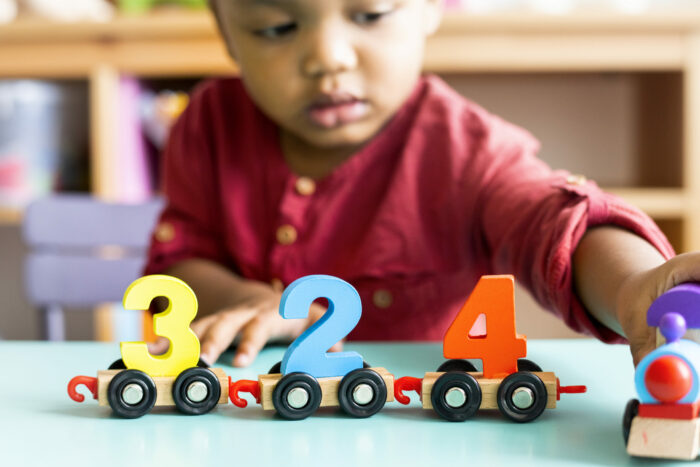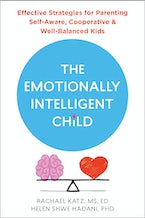By Rachael Katz, MS, Ed and Helen Shwe Hadani, PhD, coauthors of The Emotionally Intelligent Child
As early childhood educators and researchers, Helen and I spend a lot of time thinking about how to explain a child’s development to parents and caregivers. To understand how much parents and caregivers know about child development, we often ask them what they want for their child—to do well in school, get along with others, to be resilient. Over the years, one response has eclipsed the others—parents say they want their child to be a happy and kind person. In essence, they want to build their child’s executive funtion skills. From this answer, we ask, what does a parent need to know about a child’s social and emotional development? Here’s what we often tell parents.
The skill of managing one’s emotions is linked to executive function (EF)—a host of skills that that help us plan and prioritize, balance workflow, and set and achieve goals. While EF skills are often discussed in relation to traditional learning environments, such as school, these skills also help to manage emotions and interactions with others. We use these skills when working with others to take turns, share ideas, and be a part of a team. We also use EF skills to regulate our thoughts and feelings to make sure we are kind to ourselves and others.
Here’s a way to think about EF skills to help parents understand the development of EF skills in relation to social behavior and how children use them:
· Inhibition or self-control helps children make decisions by resisting impulses to do something that they would later regret. In social settings, this requires your child to resist acting according to their first instinct because that action may impact someone else negatively. So, when Thomas (three years old) resists hitting the child that is sitting on his favorite swing at the playground, he is refining his EF skills.
· Cognitive flexibility—sometimes referred to as “thinking outside the box”—is closely linked with creativity and problem-solving, and allows your child to consider different perspectives and strategies. This requires adjusting to the demands of relationships, which by nature are constantly shifting. For example, Susan is playing with Mira and Katie. Susan wants to be a butterfly, but her friends insist that she pretends to be a puppy. Susan carefully navigates the social situation by suggesting that they play flying puppies with butterfly wings. The three girls love the idea!
· Working memory allows your child to hold and mentally manipulate information in their mind and make connections between seemingly unrelated things. Charlie and Brian were making cupcakes for the bake sale. Brian could not recall how many eggs were needed in the recipe, so Charlie came up with a jingle to help Brian remember. Brian was grateful for Charlie’s help and relieved that his friend didn’t make fun of him.
· Focus or attention is critical for achieving both short- and long-term goals, and is essential for observing social interactions to anticipate how someone might respond. Arlie’s soccer team made it to the semifinals. It was her first time in a tournament, and she was nervous. She wasn’t sure if she could play with the butterflies in her stomach but when she got on the field, she focused her attention on defending and passing accurately. In the end, she assisted with making the winning goal.
A common misunderstanding is that you either have EF skills or you don’t, but it is important to remember that EF skills can be taught and modeled. And it takes several years for children to develop them.
To help your child develop their EF skills, we suggest introducing them to planning and reflecting. These techniques help foster self-control, cognitive flexibility, and memory skills. Planning helps your child to anticipate and prepare for future events, and reflecting helps to think about actions once they’ve occurred. Help your child understand, explicitly, that future events sometimes do not unfold as imagined, and that past actions have an impact on current and future events.
Here are some ways to help your child understand how to plan and reflect:
· Check in with your child in between routines. For a child, transitions occur around routines, such as morning, meals, and bedtime. Tell your child before a transition that one will be coming. Before and after transitions afford chances to talk with your child about their intentions, plans, outcomes, and reflections.
· When your child is about to begin a new task, either on their own or with others, ask them what they intend to do and the how they imagine the outcome. The aim is to elicit unexpected outcomes so they can mentally prepare for them. Ask your child about their intentions. If they intend to make a paper airplane, for example, help them identify the materials they need and inquire about the level of skill needed to achieve their goal.
· After your child completes a task or project, reflect together by talking about how things went. Discuss what worked well and determine changes for the future. Reflect together by asking questions and inquiring about the cause and effect of their actions and thoughts. Questions help your child think for themselves. Ask about significant discoveries and what they would do differently if they had a chance to do things again.
Building your child’s EF skills provides a strong foundation for their emotional intelligence, allowing them to pause, focus their attention, plan, and remember their intentions.
Rachael Katz, MS, Ed, teaches social and emotional learning skills to parents and children. She has over twenty-five years of experience as an early childhood educator and school leader. Rachael was head of the Discovery School at the Bay Area Discovery Museum, head of social and emotional learning for Early Years at Dulwich College Beijing, and an elementary classroom teacher for preschool through third grade in public and private schools.
Helen Shwe Hadani, PhD, is currently a fellow at the Brookings Institution where she conducts policy-focused research on the benefits of playful learning in both formal and informal contexts. Prior to joining Brookings, she served as director of research at the Bay Area Discovery Museum where she guided program and exhibit development. An expert in early childhood and creativity development, she has more than twenty years of experience in research and education settings, and has worked with toy, media, and technology companies, including Disney, Sesame Workshop, Apple, LEGO, Fisher-Price, and Mattel. Helen holds a BA in cognitive science from the University of Rochester, and a doctorate in psychology from Stanford University.



 2024 Peace Playbook: 3 Tactics to Avoid Clashes with Your Partner
2024 Peace Playbook: 3 Tactics to Avoid Clashes with Your Partner